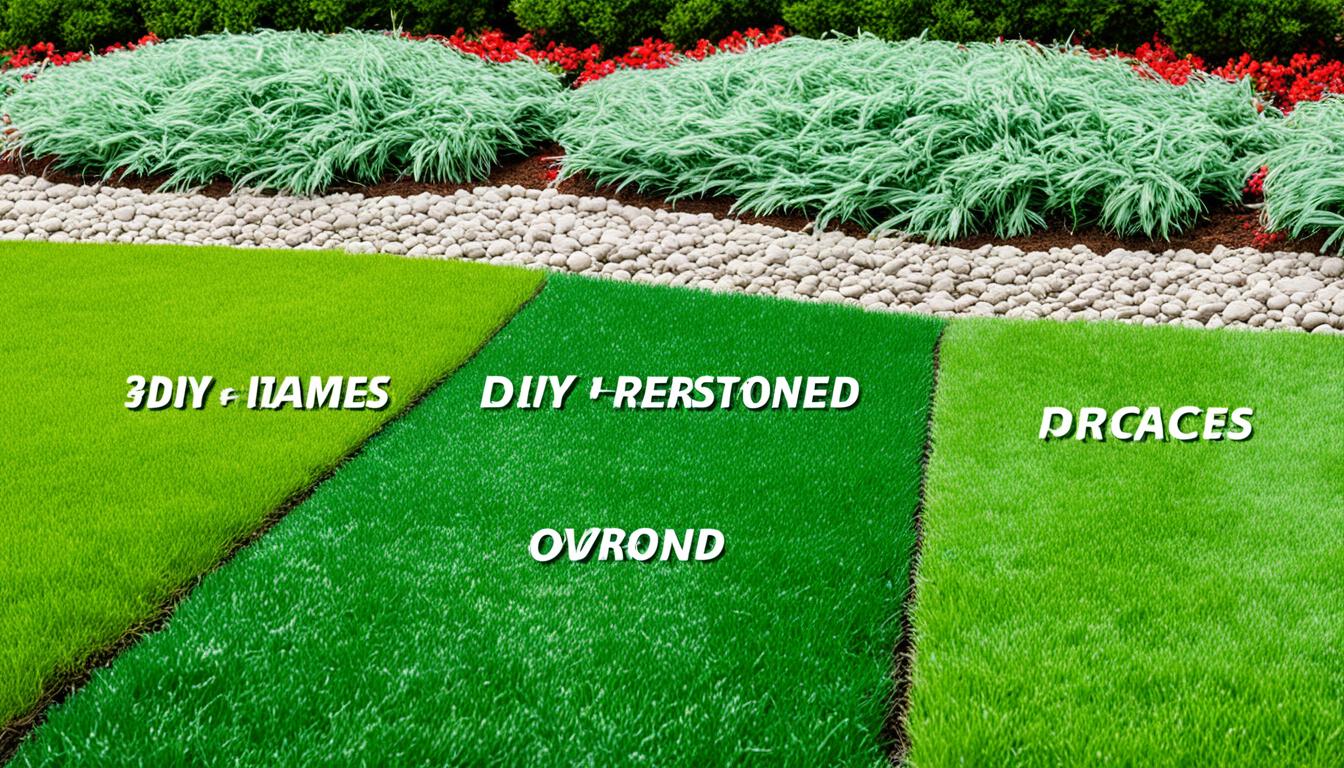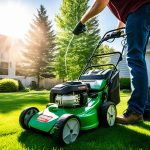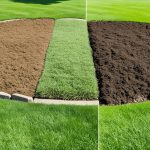A healthy and vibrant lawn is the pride of any homeowner. But as the seasons change and foot traffic takes its toll, your grass might need a little extra care to stay lush and green. One popular method for rejuvenating a tired lawn is aeration, the process of creating small holes in the soil to allow air, water, and nutrients to penetrate deep into the roots. But before you jump into this essential lawn care practice, you might be wondering: how much does it cost to aerate a lawn?
Whether you’re considering a DIY approach or hiring a professional, understanding the cost of lawn aeration is crucial in making an informed decision. Does it fit within your budget? Is it worth the investment? And what factors contribute to the overall cost? In this article, we’ll dive into all the essential details and shed light on the average cost of lawn aeration, factors that affect pricing, related services, and the benefits that can be achieved. So, let’s get started and find out just how much it really costs to aerate a lawn!
Key Takeaways:
- The national average cost of lawn aeration is $143, with most homeowners paying anywhere from $82 to $251.
- The size of the lawn is the most significant contributing factor to aeration cost, with the average U.S. yard size being 10,000 square feet.
- Other factors that affect the cost include lawn preparation, slope of the yard, and the type of aeration.
- The cost of DIY aeration ranges from $53 to $170, while professional aeration services cost between $82 and $251.
- Lawn aeration offers numerous benefits including improved grass health, enhanced root growth, reduced water pooling, and increased nutrient absorption.
Average Lawn Aeration Costs in 2024
The cost of lawn aeration can vary depending on various factors. In 2024, the national average cost for lawn aeration is $143, with prices typically ranging from $82 to $251. However, it’s important to note that the low-end cost can be as affordable as $43, while the high-end cost can reach up to $496. These cost ranges are based on the average yard size of 10,000 square feet, which is common among homeowners. Keep in mind that actual pricing may vary depending on location and other contributing factors.
Understanding the average lawn aeration costs for 2024 can help homeowners plan and budget accordingly. Whether you opt for DIY aeration or hire professional services, having a clear idea of the expected expenses can guide your decision-making process.
Lawn Aeration Cost Estimator by Size
When estimating the cost of lawn aeration, the most important factor to consider is the size of your lawn. The average cost for an average-sized yard of about 10,000 square feet is $143. However, you can use a cost estimator based on your specific yard size.
Below is an estimate of the cost of lawn aeration based on various yard sizes:
| Yard Size | Cost |
|---|---|
| 5,445 square feet | $71 |
| 10,000 square feet | $143 |
| 20,000 square feet | $286 |
| 43,560 square feet (1 acre) | $571 |
These estimates provide a general idea of the cost based on yard size, but it’s always recommended to get a personalized quote from a lawn care professional to get an accurate cost based on your specific lawn.
Using a lawn aeration cost estimator can help you budget for this maintenance task and ensure you know what to expect in terms of pricing. By entering the size of your lawn, the estimator will provide you with an estimate of the cost based on the average cost per square foot for aeration services.
Other Factors That Affect Cost
In addition to yard size, there are several other factors that can influence the cost of lawn aeration. These factors include:
- Lawn Preparation: The cost of lawn preparation can impact the overall cost of aeration. This may involve additional services such as mowing, raking, and debris removal to prepare the lawn for aeration.
- Slope of the Yard: The slope of the yard can also affect the cost of aeration. Steep inclines require more time and effort to aerate, which may result in higher costs.
- Type of Aeration: The type of aeration chosen can have an impact on the cost. There are different types of aeration, including liquid aeration, spike aeration, and core aeration. Each type has its own cost associated with it.
Let’s take a closer look at each of these factors:
Lawn Preparation
Proper lawn preparation is essential for successful aeration. This may involve services such as mowing the lawn to an appropriate height, raking to remove surface debris, and ensuring that the lawn is clear of any obstacles that could hinder the aeration process.
Depending on the condition of your lawn and the services required, lawn preparation can vary in cost. Some homeowners may choose to perform these tasks themselves, while others may opt to hire a professional lawn care service.
Slope of the Yard
The slope of your yard can impact the cost of aeration. Steeper inclines require more time, effort, and specialized equipment to perform aeration effectively. The extra labor and equipment needed for yards with significant slopes may result in higher costs compared to yards with minimal or no slope.
Type of Aeration
There are different types of aeration methods, each with its own advantages and associated costs:
- Liquid Aeration: Liquid aeration involves the application of a liquid product to the lawn to enhance soil structure and air exchange. While liquid aeration is the least expensive option, it is generally considered to be less effective compared to other methods.
- Spike Aeration: Spike aeration utilizes solid tines or spikes to create holes in the soil. This method is more affordable compared to core aeration but may not effectively alleviate soil compaction.
- Core Aeration: Core aeration is considered the most effective method for addressing soil compaction. It involves the removal of small plugs of soil, allowing for better air circulation, water absorption, and root growth. Core aeration is typically more expensive compared to liquid and spike aeration methods.
Considering the specific needs of your lawn and consulting with a professional can help determine the most suitable type of aeration method that balances cost and effectiveness.
Related Services
In addition to lawn aeration, there are several other related services that homeowners often consider to maintain a healthy and vibrant lawn. These services can be combined with aeration for a comprehensive lawn care package, providing various benefits to your yard. Some of the most common related services include:
- Lawn Mowing: Regular mowing helps keep your grass at an optimal height, promoting healthy growth and preventing weed infestation. The cost of lawn mowing can vary depending on factors such as yard size, grass length, and frequency of service.
- Overseeding: Overseeding is the process of planting new grass seeds to thicken the lawn and fill in bare patches. It helps improve the overall density and appearance of the grass. The cost of overseeding depends on the size of the area and the type of grass seed used.
- Lawn Fertilization: Fertilizing your lawn provides essential nutrients that promote lush growth, vibrant color, and improved resistance to pests and diseases. The cost of lawn fertilization can vary based on yard size, type of fertilizer, and application frequency.
- Dethatching: Dethatching involves removing the layer of dead grass and debris (thatch) that accumulates on the soil surface. This process improves air circulation, water penetration, and nutrient absorption. The cost of dethatching depends on the size of the lawn and the thickness of the thatch layer.
Many professional lawn care companies offer packages that combine these services, allowing homeowners to save time and money. When bundled together, these services may come at a discounted rate compared to individual service costs. Additionally, lawn care companies can customize the package based on your specific lawn care needs and regional requirements.
It’s important to consider factors such as yard size, grass type, and condition of the soil when determining the cost of these related services. Consulting with a professional lawn care provider can help you assess your lawn’s specific needs and create a tailored plan that meets your goals and budget.
Cost Comparison of Related Lawn Care Services
| Service | Average Cost | Factors Affecting Cost |
|---|---|---|
| Lawn Mowing | $30 – $50 per visit | Yard size, grass length, frequency of service |
| Overseeding | $100 – $200 per 1,000 square feet | Area to be overseeded, type of grass seed |
| Lawn Fertilization | $50 – $150 per application | Yard size, type of fertilizer, application frequency |
| Dethatching | $75 – $150 per hour | Size of the lawn, thickness of the thatch layer |
Note: The costs listed in the table are approximate and can vary based on various factors. It’s recommended to consult with lawn care professionals for accurate pricing based on your specific needs.
Cost of Aerating Your Lawn DIY
If you choose to aerate your lawn yourself, there are options for DIY aeration. There are different methods of DIY aeration, with varying costs and effectiveness. Here are a few options:
Liquid Aeration
Liquid aeration is the cheapest method, but it is also the least effective. It involves spraying a liquid solution onto the lawn to promote soil loosening. While it may provide some benefits, it is not as thorough as other methods and may not penetrate compacted soil effectively. The cost of liquid aeration products can range from $20 to $50.
Spike Aeration
Another DIY option is spike aeration, which involves using devices such as pitchforks or manual spike aerators to puncture holes in the soil. This method provides better soil penetration and can help alleviate compaction to some extent. Spike aerators typically range from $20 to $50 in cost.
Core Aeration Equipment Rental
For more effective and professional-grade aeration, you can consider renting equipment for core aeration. Rental options include the PRO Aerator or compact core aerators available at home improvement stores like Home Depot. The cost of equipment rental can range from $55 to $108 per day, depending on the type of aerator and rental duration. While this may be a higher upfront cost compared to other DIY methods, core aeration ensures more thorough results, especially for compacted soil.
DIY Cost vs. Professional Cost
When considering aerating your lawn, you have two main options: DIY or hiring a professional service. While the cost may play a significant role in your decision, it’s essential to understand the differences and trade-offs involved.
DIY Cost:
DIY lawn aeration can provide cost savings, ranging from $53 to $170, depending on the equipment rented and the time and effort involved. However, the actual cost may vary based on factors such as the size of your lawn and the type of equipment you choose to rent.
Professional Cost:
On the other hand, professional lawn aeration services typically range from $82 to $251. While this may seem more expensive upfront, it’s essential to consider the value and benefits that professionals bring to the table.
When deciding between DIY and professional aeration, it’s crucial to weigh the following factors:
- The level of expertise and experience required for a thorough aeration process.
- The amount of time and physical effort you’re willing to invest in aerating your lawn.
- The quality and effectiveness of the results obtained from DIY versus professional aeration.
While DIY aeration may be more cost-effective, it requires significant time and physical labor. If you have a smaller lawn and are willing to put in the effort, DIY may be a viable option. However, for larger yards or those with more complex needs, professional aeration services can ensure a more comprehensive job, saving you time and energy.
Ultimately, the decision between DIY and professional aeration comes down to your preferences, resources, and the level of care you want for your lawn.
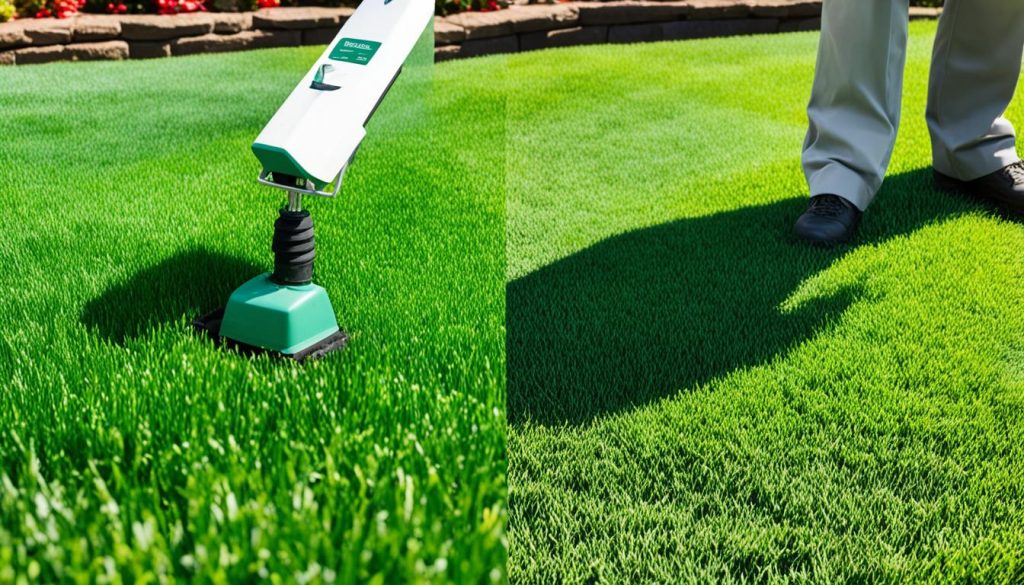
Cost of Lawn Aeration by Location
The cost of lawn aeration can vary significantly depending on the location. Several factors influence the cost, including the cost of living in the area and the average yard size. Additionally, tax rates, such as sales tax and state and local income tax, can impact the overall cost of lawn aeration. The type of soil found in the local area is another key factor that affects the cost of aeration services.
When it comes to locations with a higher cost of living, the price of lawn aeration tends to be higher. These areas often have larger average yard sizes, which require more time and effort to aerate. As a result, the cost of aeration services is generally higher in these regions.
Tax rates also play a role in determining the cost of lawn aeration. Areas with higher tax rates, including sales tax and state and local income tax, may have slightly higher prices for aeration services as these costs are factored into the overall service fees.
Additionally, the type of soil in the local area can impact the cost of aeration. Certain soil types, such as clay or compacted soil, may require more extensive aeration treatments, which can lead to higher costs. The condition of the soil and the level of compaction can influence the amount of time and effort required to properly aerate the lawn.
Overall, when considering the cost of lawn aeration, it is important to take into account the location, cost of living, tax rates, and soil type prevalent in the area. These factors can have a significant impact on the final price of aeration services.
Benefits of Lawn Aeration
Lawn aeration offers a multitude of benefits that contribute to the overall health and vitality of your grass, resulting in a lush and thriving lawn. Let’s explore these benefits in more detail:
- Improved Grass Health: Aeration helps to rejuvenate the lawn by creating small holes in the soil, allowing oxygen, nutrients, and water to reach the grassroots more easily. This enhanced airflow and nutrient supply promote healthier grass growth and overall vitality.
- Enhanced Root Growth: The process of aeration stimulates root development by loosening compacted soil. With improved soil structure, grass roots can penetrate deeper, accessing essential nutrients and water, and fostering stronger root systems.
- Reduced Water Pooling: Soil compaction can lead to water pooling on the surface, preventing it from reaching the root zone efficiently. By addressing this issue through aeration, you can minimize water pooling and ensure better water absorption, reducing the risk of disease, mold, and mosquito breeding grounds.
- Increased Nutrient Absorption: Compacted soil limits nutrient availability to the grass, hindering its overall health and growth. With aeration, the soil becomes more receptive to fertilizers, allowing the grass to absorb essential nutrients more effectively, leading to improved nutrition and lush greenery.
Visualizing the Benefits of Lawn Aeration
To better understand the positive impact of lawn aeration, take a look at this illustrative chart:
| Benefits | Description |
|---|---|
| Improved Grass Health | |
| Enhanced Root Growth | |
| Reduced Water Pooling | |
| Increased Nutrient Absorption |
As shown in the chart, lawn aeration delivers multiple benefits, resulting in improved grass health, enhanced root growth, reduced water pooling, and increased nutrient absorption.
By prioritizing regular lawn aeration, you can create an optimal environment for your grass to thrive, yielding a vibrant, resilient, and beautiful lawn.
Best Lawn Care Services for Aeration
When it comes to ensuring your lawn receives the best care, choosing the right lawn care service is essential. One of the top lawn care services in the United States is TruGreen. They offer comprehensive lawn care plans that include professional aeration services, along with various other treatments to keep your lawn healthy and vibrant.
TruGreen understands the importance of aeration in maintaining a lush and thriving lawn. Their professional aeration services are performed by trained experts who know how to effectively aerate your lawn to promote optimal growth and health.
TruGreen offers customizable lawn care plans that cater to your specific needs. Whether you require a one-time aeration service or want to include aeration as part of your ongoing lawn maintenance package, TruGreen has options to suit your requirements.
During our research, we obtained quotes for TruGreen’s aeration service for a 5,000 square-foot lawn. The cost of this service is approximately $259. Keep in mind that prices may vary depending on the size and condition of your lawn, as well as your location.
To give your lawn the best chance to thrive, consider TruGreen’s lawn care services that include professional aeration. Experience the satisfaction of a healthy and beautiful lawn with the help of experts who understand the unique needs of your grass.
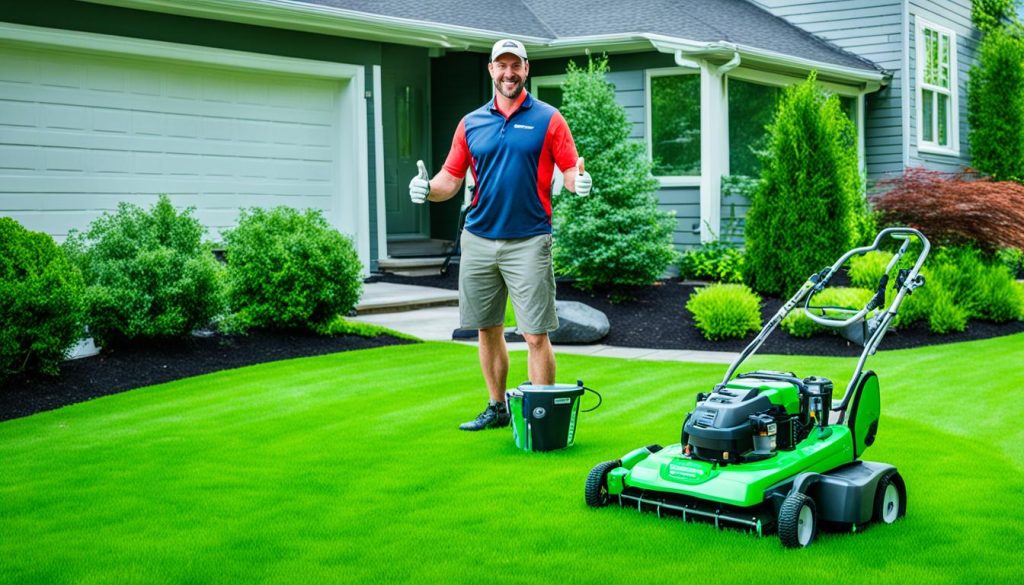
| Lawn Care Service Provider | Package Includes | Cost (5,000 sq ft lawn) |
|---|---|---|
| TruGreen | Professional aeration services and other lawn care treatments | $259 |
| Provider 2 | Package details | $ |
| Provider 3 | Package details | $ |
Choosing the Right Lawn Care Service
When selecting a lawn care service for aeration, there are a few factors to consider. First, evaluate the reputation and experience of the service provider. Look for reviews and testimonials from satisfied customers to ensure they deliver quality results.
Additionally, consider the range of services offered by the provider. A comprehensive lawn care package that includes aeration, along with other treatments such as mowing, fertilization, and weed control, can provide your lawn with the full range of care it needs.
Finally, compare the prices and packages offered by different lawn care service providers. While cost is an important consideration, prioritize quality and expertise to achieve the best results for your lawn.
Lawn Aeration Methods and Types
When it comes to lawn aeration, there are different methods and types that you can choose from. Each method offers unique benefits and factors into the overall cost of the aeration process.
Core Aeration
Core aeration is one of the most commonly used methods for improving soil compaction and promoting healthy grass growth. This method involves removing small plugs or cores of soil from the ground, allowing air, water, and nutrients to penetrate the root zone more effectively. Core aeration is recommended for lawns with heavily compacted soil.
Spike Aeration
Spike aeration, also known as solid tine aeration, is another method frequently used to alleviate soil compaction. It involves puncturing the soil with solid tines or spikes, creating small holes that allow air and water to reach the grass roots. Spike aeration is typically less expensive than core aeration, but it may not be as effective in relieving compaction and improving soil quality.
Liquid Aeration
Liquid aeration is an alternative method that involves spraying a liquid solution onto the lawn. This solution helps break up compacted soil, allowing better air and water penetration. Liquid aeration is generally the least expensive method and is often used as a supplement to core or spike aeration.
To understand the cost implications of these methods, let’s take a look at the average prices:
| Aeration Method | Cost Range |
|---|---|
| Core Aeration | $150 – $400 |
| Spike Aeration | $100 – $250 |
| Liquid Aeration | $50 – $150 |
Keep in mind that these cost ranges are estimates and can vary depending on factors such as the size of your lawn, the condition of the soil, and the service provider you choose.
Importance of Lawn Aeration Timing
The timing of lawn aeration is crucial for optimal results. Ensuring that you aerate your lawn at the right time allows the grass to reap the maximum benefits of the aeration process. It’s important to consider the type of grass you have and its growth patterns when determining the best time for lawn aeration.
Warm-Season Grasses
For lawns with warm-season grasses such as Bermuda grass, Zoysia grass, or St. Augustine grass, the best time for aeration is during the peak of their growing season. This usually falls in late spring or early summer when the grass is actively growing and has high metabolic activity. Aerating during this time helps the grass recover quickly from the aeration process, promoting healthier growth and providing better results.
Cool-Season Grasses
If your lawn has cool-season grasses like Kentucky bluegrass, fescue, or ryegrass, the optimal time for aeration is in early spring or fall. These grasses have active growth periods during cooler temperatures, and aerating during these seasons allows them to benefit the most. In early spring, aeration helps remove thatch buildup and allows better nutrient and water absorption. Fall aeration prepares the grass for winter dormancy and promotes a stronger root system for better recovery in the spring.
By aerating your lawn at the right time, you give your grass the best chance to thrive and stay healthy. It’s important to follow the recommended timing based on the type of grass you have to ensure you achieve optimal results.
Conclusion
Lawn aeration is an essential practice that enhances the overall health and vitality of your lawn. By allowing air, water, and nutrients to penetrate the soil effectively, aeration promotes deep root growth and improves the overall quality of your grass.
The cost of lawn aeration depends on several factors, such as the size of your lawn, the type of aeration method chosen, and your location. DIY aeration may seem cost-effective initially, but it requires a significant investment of time and effort. Opting for professional aeration services not only saves you time and energy but also ensures a more thorough and efficient job.
Additionally, considering related services such as lawn mowing, overseeding, fertilization, and dethatching can provide further benefits to your lawn. Many lawn care companies offer bundling options and customized packages that cater to your specific needs.
In summary, lawn aeration is an investment worth considering for maintaining a healthy and beautiful lawn. Whether you choose to tackle the task yourself or rely on professionals, the key takeaway is to prioritize regular aeration, as it plays a crucial role in keeping your lawn vibrant and thriving.

